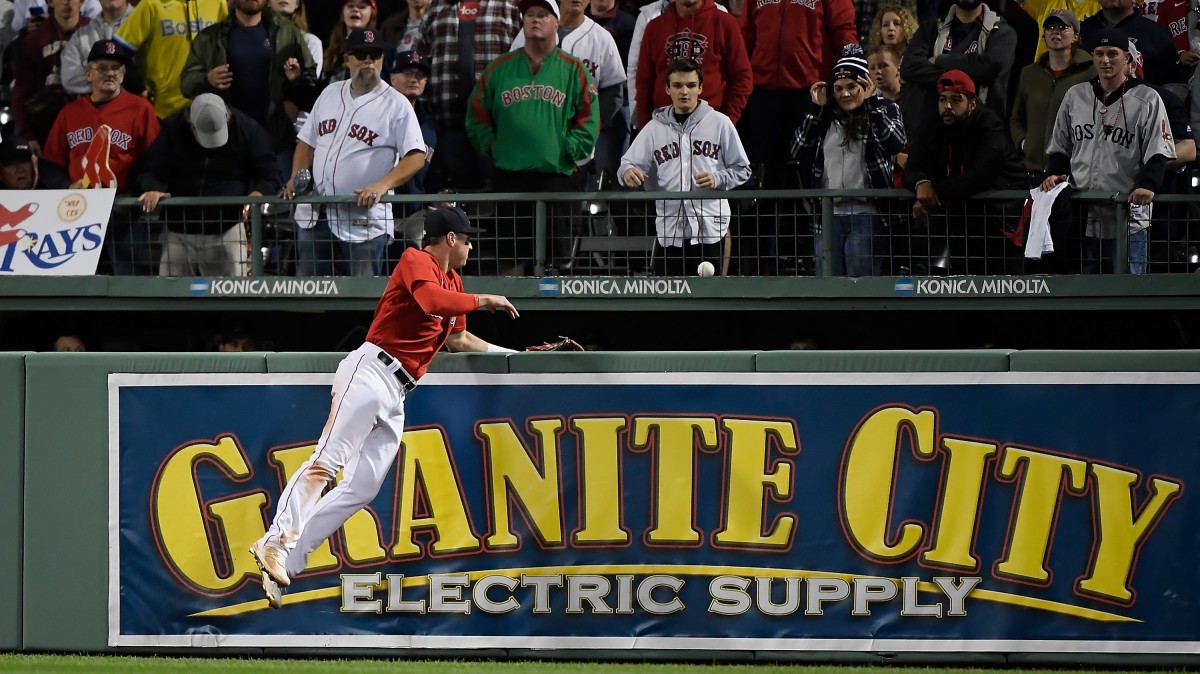A Big Bounce Goes Boston’s Way to Deal Rays ‘Heartbreaker’ of a Loss

BOSTON — In the 13th inning, Rays manager Kevin Cash strode out onto the field and asked the umpires a question of frustration, or perhaps desperation.
Is there anything you can do?
This is generally not the line of questioning that a manager wants to take deep in the fifth hour of a crucial playoff game. But it was hard to think of what else he might have asked at this point. The Rays had come from behind late to tie the Red Sox and send Game 3 of the ALDS to extra innings. Now, with two outs in the top of the 13th, they seemingly had a chance to go ahead—or perhaps not.
The play was a freak marriage of angles and timing and a serendipitously low fence. Rays third baseman Yandy Díaz had been on first base when Kevin Kiermaier appeared to drive him in by sending one deep to right field. But the ball ricocheted in a fraught, uncanny game of pinball—it hit the outfield wall, rebounded onto Red Sox fielder Hunter Renfroe, and finally bounced over the short fence into the bullpen.

Had it not touched Renfroe, it would have been an obvious automatic double, with Kiermaier at second while Díaz would advance to third. No one would score. But, of course, it had touched Renfroe. That misplay had allowed Díaz to cross home plate with ease, and he stood there now, unclear if he had just scored a potential winning run or if he needed to return to third.
If all this triggered a wave of confusion for the crowd and for the teams themselves—could this be a game-winning run for Díaz?—it did not for crew chief Sam Holbrook.
The umpire knew the ruling: This was a double. If a fair ball not in flight is deflected by a fielder and goes out of play, the award is two bases from the time of the pitch. (That’s Item 20 in the umpire manual, per Holbrook, and a reference to Official Baseball Rule 5.06(b)(4)(H).) The ball had not been in flight when it was deflected because it hit the wall first. Awarding two bases from the time of the pitch meant that no one would score. The rule was simple in the umpires’ eyes, “cut and dried,” Holbrook said. But as Cash came out to ask if there was something, anything else that might be available for them to try, Holbrook agreed to review the play.
“I said, ‘Well, if you want us to take a look at it, we’d be glad to take a look at it,’” Holbrook told reporters. “Obviously, it’s a high-priority game, high-priority situation, and we want to make sure that we get everything right.”
This ball hit the wall, then hit Hunter Renfroe, then went over the wall for a ground rule double pic.twitter.com/Ks1foZpAhB
— Ben Brown 🌻 (@BenBrownPL) October 11, 2021
The only factor that could have made a difference was if it was determined that Renfroe had deliberately sent the ball over the fence: “If it was intentionally kicked out, then it would have been from the time that the deflection, the intentional deflection, happened—two bases from that time,” said Holbrook. That would have opened up the possibility to score Díaz. But as the seconds ticked on, the game frozen, as the play was put under review, it was clear that there was nothing to suggest any intention from Renfroe. The call was upheld.
Sign up to get the Five-Tool Newsletter in your inbox every day during the MLB playoffs.
Kiermaier was sent to second and Díaz back to third. With two outs, Mike Zunino came to the plate to try to keep their hopes alive a little longer, and he struck out.
That would turn out to be the final at-bat for the Rays. A few minutes later, in front of an exhausted but electric crowd at Fenway Park, Boston catcher Christian Vázquez made contact with the first pitch that he saw in the bottom of the inning, a 96 mph fastball. He drove it over the fence to walk it off.
The Red Sox had won, 6-4, in 13 innings, putting them one victory away from the ALCS.

“For the ball to bounce off the wall and then hit a player and go over, I just can’t believe that is a ground-rule double… I mean, Yandy would have scored standing up. It’s a heartbreaker, plain and simple,” Kiermaier said. “That’s the ruling, the umpires explained it to me, so I can’t go against that. The rules are what they are. But, man, that’s a heartbreaker.”
The game, of course, was far more than this one play. There were plenty of missed chances on both sides. Each team left 10 men on base; Tampa Bay was 1-for-9 with runners in scoring position while Boston was 1-for-10. Both teams had to use the pitchers who had been projected as their likeliest starters for Game 4. That was Nick Pivetta for the Red Sox, who offered a nearly flawless performance over the final four innings, and Luis Patiño for the Rays, who gave up the walk-off home run in his second inning of work.
Ultimately, that leaves an uncertain landscape for Game 4 on Monday. In a series where both bullpens had already received significant work—no starter has lasted more than five innings in any of the three games—Tampa Bay and Boston had to use nine and seven pitchers, respectively, on Sunday. (Neither Cash nor Red Sox skipper Alex Cora was able to commit to a starter for tomorrow, though it’s likeliest that Tampa Bay goes with some kind of bullpen game, and that Boston goes with a short-rested Eduardo Rodriguez.) There were myriad other chances for both teams that would have rendered irrelevant the run-scoring double that wasn’t.
But being as it was such a precise confluence of factors at such a tense moment—whether perfect or perfectly heartbreaking—with a rule clearly applied to a scenario rarely seen, making for such an obvious turning point, it was hard to think about much else.
“I was speechless,” said Red Sox center fielder Kiké Hernández. “I’ve never seen that before in my life. I wasn’t sure what was going to get called. I wasn't sure if the runners had to return. I wasn't sure if it was going to be like an errant throw where the runner would get two bags. Like, I had no idea.
“Luckily, it went our way. And you call it home-field advantage if you want, call it whatever you want, but we won.”
More MLB Coverage:
• Inside Kris Bryant's Journey From Chicago to San Francisco
• Unlikely Offensive Heroes Help Dodgers Even Up NLDS
• Why the Astros Are So Dangerous in the Postseason
• J.D. Martinez Provides Spark to Propel Red Sox in ALDS
